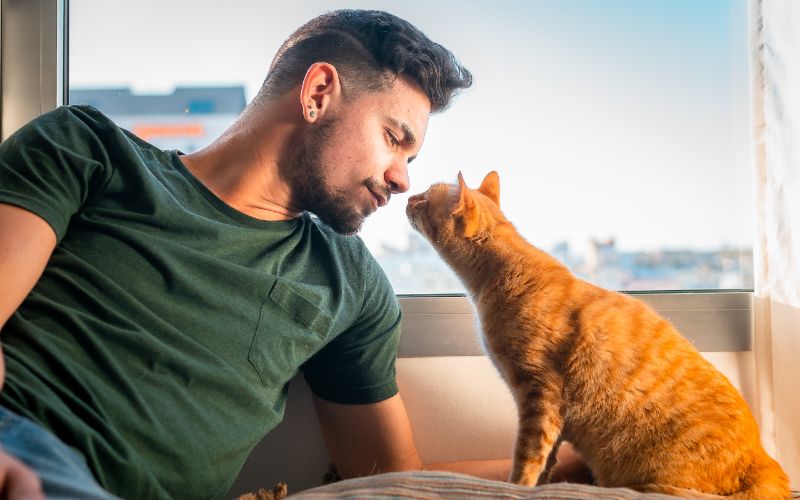My Cat Just Threw Up, What Do I Do? 5 Vet-Approved Steps
By Brooke Bundy
Updated on
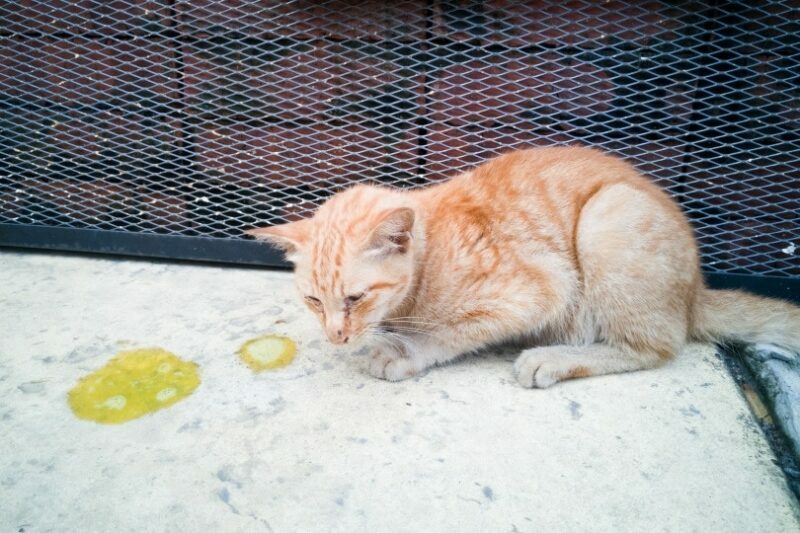
We care for our cats like we would for our own kids. When we discover that they’re feeling sick, we might feel the urge to immediately panic or rush them to the vet. Unfortunately, kitty vomit is a fairly common occurrence, for reasons ranging from ingesting tufts of fur to choking down large amounts of food. Of course, there are times when you actually do need to take your cat to the emergency clinic, such as if you find blood in their vomit or if they aren’t able to sustain any water for longer than 12 hours. Most times, though, you simply need to comfort them and wait it out.
The 5 Things to Do When Your Cat Throws Up
It doesn’t matter if we’re asleep or in the middle of a project. Few noises jerk our attention like the haggling of a cat getting ready to puke. Before you start to panic, here are a few things to keep in mind:
1. Stay Calm
Your cat clearly doesn’t feel well and will depend on you to comfort them. You definitely shouldn’t yell at them, or act like they’re in trouble for puking—even if they’ve selected your new dining room rug.
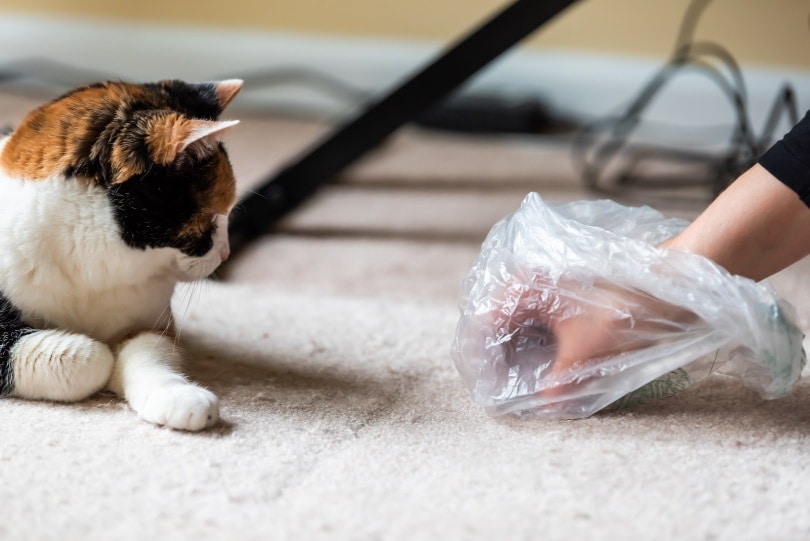
2. Examine the Vomit
Once your cat has ceased vomiting, carefully inspect the puke for anything that would explain the cause of their strange behavior, such as foreign objects, hair, worms, or blood. If you want, take pictures so that you can show the vet later if you end up needing to take them in. Brown or bloody vomit necessitates taking them immediately. Bile or whitish vomit isn’t usually dangerous, though. It usually means they drank water too quickly or waited too long to eat.
3. Clean Up the Vomit
After you’ve mopped up the mess with some paper towels and an enzymatic cleaner, you might want to cover the entire area with antibacterial spray, especially if you have other animals who could catch a contagious illness.
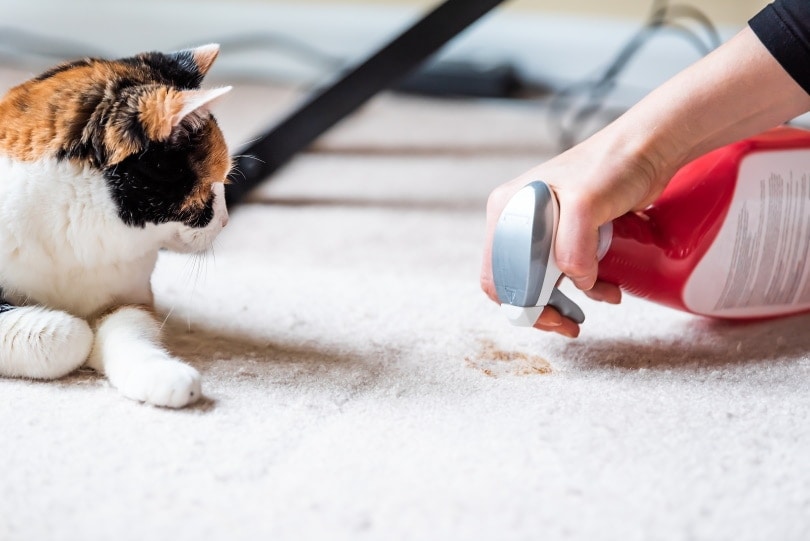
4. Try to Figure Out the Cause
If you spotted anything alarming in their vomit, such as blood or worms, you should call your vet immediately. If the cause is still unknown, monitor your cat’s behavior for other symptoms.
5. Temporarily Take Away Their Food, but Give Them Constant Access to Water
Always make sure your cat has fresh water available. You might want to hold off on the food, however, until you can figure out what’s going on. If your cat resumes drinking water and keeps it down for a few hours, bring the food back. Start with about 25% of what they would normally eat in a day, and gradually increase if they seem to be doing better.
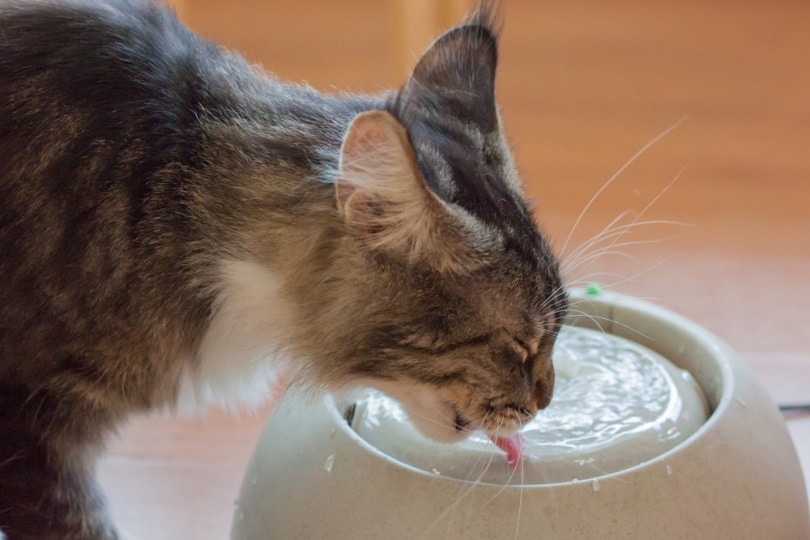
Why Do Cats Vomit So Much?
A variety of illnesses can cause your cat to vomit. Most times, however, cat vomit is benign, and results from them eating too quickly or ingesting something inappropriate, such as hairballs or string. Here are a few reasons your cat may not be feeling well:
They’re Young
Kittens may be more likely to throw up than adult cats. Newly weaned from the mother’s milk, your kitten’s tummy is still adjusting to a different food. Even moving to another house when they’re adopted can expose them to unfamiliar bacteria that might cause indigestion. Plus, the anxiety they may feel during the first few days in a new place may create an upset stomach. Kittens also sustain voracious appetites as they play and transition into their adult bodies. Sometimes they may wait too long to eat, and then gulp down way too much food at once, some of which will then return to the floor.
Intestinal Parasites
Unfortunately, parasites are another reason that kitties are prone to puking. Worms can travel into their intestines via other parasites, such as fleas, or through their mother’s milk. It’s important to deworm your kitten as soon as they’re old enough and monitor them for other signs of worms, such as dehydration, stunted growth, or losing too much weight. While adult cats may also host parasites if they haven’t been dewormed, worms can be life-threatening in growing kittens and should be treated as soon as possible. You should still deworm your adult cats periodically, and take them to the vet if you notice them suddenly losing weight, as this can also be a sign of serious illness such as kidney disease.
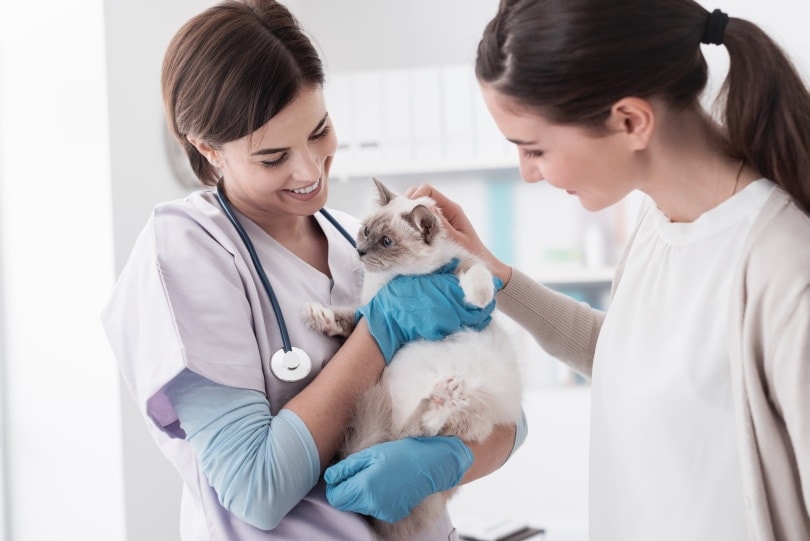
Rotten Food
Perhaps your indoor-outdoor cat likes to nose through the neighbor’s trash, and they found a tantalizing, 10-day-old slice of turkey. Yum. Food poisoning can affect our animals, especially bacteria such as salmonella. You might wonder how cats make it “in the wild,” but there’s a difference between a feline feasting on a fresh kill and eating meat from the butcher that’s been sitting in a case or in the trash for days. You shouldn’t feed raw meat to your pet unless it’s a raw meat diet approved by your veterinarian because of the inherent dangers of undercooked meat.
Inappropriate or Toxic Substances
Some human foods such as chocolate, grapes, and alcohol are toxic to cats. These will make your cat very sick, potentially to the point of death, depending on how much they ate. Your cat might have also eaten something that’s not even food. For reasons unknown, some felines have an affinity for plastic and are known for munching on everything from grocery bags to kid’s toys.
Foreign Objects, Such as Hair or Thread
Your cat might’ve swallowed something non-toxic, but still indigestible, such as hair, grass, or paper. Since cats groom themselves by licking, they frequently ingest their own fur. Most times hairballs will pass in their poop, but occasionally they can cause an obstruction that won’t pass the normal way and must come back up.
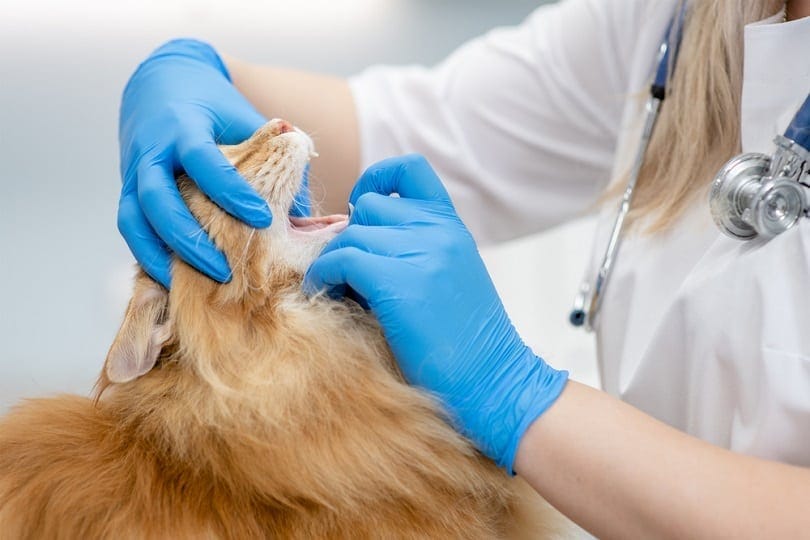
Disease or Cancer
We only mention disease because it’s a possible explanation. However, chronic illness isn’t the most likely cause of cat vomit unless your cat presents a range of other symptoms.
Anxiety
Anything from car rides to unfamiliar guests can trigger gut-wrenching anxiety in your cat. When trying to figure out the cause, note if there’s a pattern, such as car sickness.
Eating Too Fast
Like kittens, adult cats may essentially starve themselves and then gulp down way too much food too quickly. Usually, they’ll puke if they stuff themselves past a certain point.
Food Allergies
Unfortunately, cat food allergies are a mystery, and can occur at any point in your feline’s life. Just because your cat was born with a tolerance for chicken doesn’t mean they always will. Your vet may recommend a limited-ingredient diet to try to investigate whether your cat’s ailments are allergy-related.
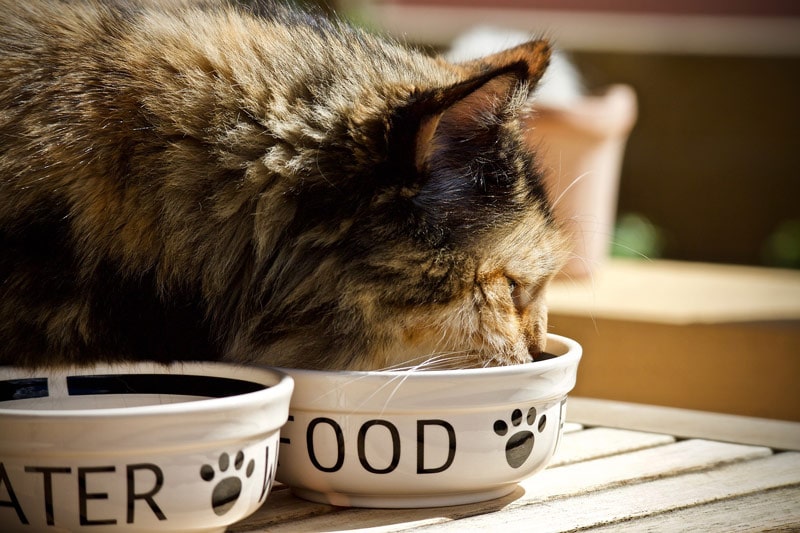
When Should You Call Your Vet If Your Cat Vomits
You should always take your cat to the vet if you see blood or worms in their poop or vomit. If your cat is exhibiting any other symptoms of illness, such as lethargy or trouble breathing, you should also take them in immediately. Otherwise, continue to monitor them for the next few hours. If they throw up again on the same day, or if they still can’t hold down water after 12 hours, it’s time to go to the vet. Continuous vomiting can rapidly cause severe dehydration, which can require intravenous fluids past a certain point.
Additionally, while cat puke isn’t altogether abnormal, it is a problem if your cat regularly throws up more than once a week. Chronic vomiting is defined as vomiting more than once a week, or frequently on and off for longer than 3 months. Regular vomiting can be a sign of a serious problem such as food allergies, kidney disease, or cancer. Your vet will need to thoroughly evaluate your cat to figure out the underlying cause.
 How to Prevent Cats from Vomiting
How to Prevent Cats from Vomiting
Vomiting isn’t fun for either party, you or your cat. While not all causes are preventable, here are a few easy things you can do to reduce the risk of your cat feeling sick:
1. Keep Them Parasite-Free
Make sure your cat is on a vet-approved form of flea prevention, such as collars, pills, or sprays. Fleas can introduce intestinal worms into your cat’s stomach when they’re inadvertently swallowed, so banishing these pests should help keep the worms at bay.
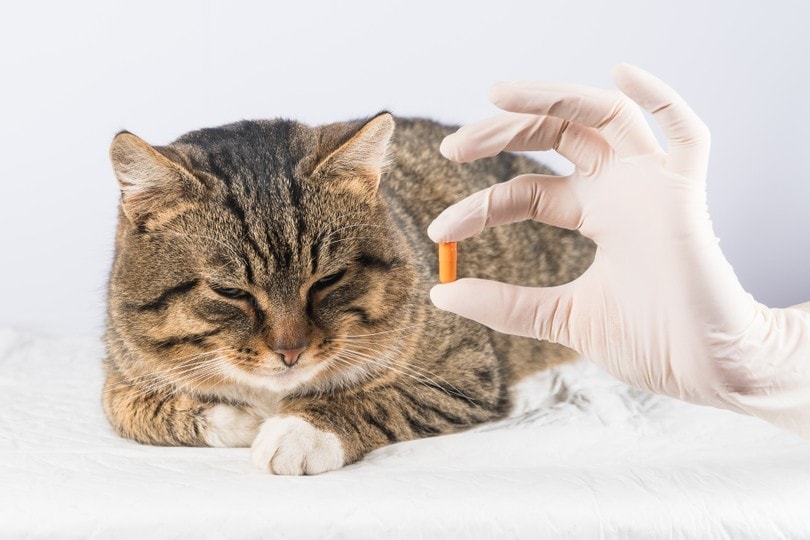
2. Control Your Cat’s Binge-Eating.
If your cat tends to eat too much in one sitting, give them smaller meals spaced a few hours apart, or invest in an automatic feeder if you’re not home all day.
3. Secure Inappropriate Food and Objects
If your cat likes to steal human treats, you’ll need to make sure you store away all dangerous delights such as chocolate and coffee away from their greedy paws. You should also “cat-proof” your place by not leaving potentially intriguing objects lying around, such as threads and hair ties.
Conclusion
Cat vomit is certainly something to ponder, but not usually a reason to go straight to the vet. However, you’ll need to monitor your cat for other signs of illness. Dehydration, chronic vomiting, or spotting blood or worms in their vomit or poop are all signs of a medical emergency that requires attention as soon as possible. Otherwise, hold back on the food for a few hours while they recover and give them a constant supply of water and attention to help them feel better soon.
Featured Image Credit: ThamKC, Shutterstock






